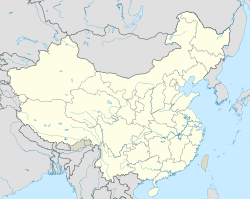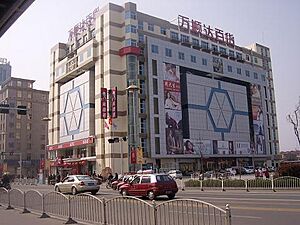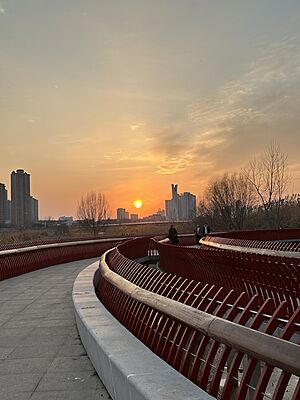Zhoukou facts for kids
Quick facts for kids
Zhoukou
周口市
Chowkow
|
|
|---|---|
|
Prefecture-level city
|
|

Shaying River near downtown of Zhoukou City
|
|

Zhoukou in Henan
|
|
| Country | People's Republic of China |
| Province | Henan |
| Area | |
| • Prefecture-level city | 11,959 km2 (4,617 sq mi) |
| • Urban | 141 km2 (54 sq mi) |
| • Metro | 1,454 km2 (561 sq mi) |
| Population
(2020 census for total, 2018 otherwise)
|
|
| • Prefecture-level city | 9,026,015 |
| • Density | 754.747/km2 (1,954.78/sq mi) |
| • Urban | 721,300 |
| • Urban density | 5,116/km2 (13,250/sq mi) |
| • Metro | 1,601,300 |
| • Metro density | 1,101.3/km2 (2,852.4/sq mi) |
| GDP | |
| • Prefecture-level city | CN¥ 226.4 billion US$ 34.1 billion |
| • Per capita | CN¥ 25,682 US$ 3,866 |
| Time zone | UTC+8 (China Standard) |
| Postal code |
466000
|
| Area code(s) | 0394 |
| ISO 3166 code | CN-HA-16 |
| Vehicle registration | 豫P |
| Major Nationalities | Han |
| County-level divisions | 9 |
| Township-level divisions | 1 |
Zhoukou (Chinese: 周口; pinyin: Zhōukǒu) is a large city in eastern Henan province, China. It is home to over 9 million people, making it a very populated area. The city is known for its rich history and its important location where two rivers meet.
Zhoukou has a deep cultural past. It is believed to be where Emperor Yao, an ancient Chinese ruler, lived. It is also the birthplace of Laozi, a famous philosopher who founded Taoism. The city has been shaped by the ancient Chen and Chu cultures, giving it a special historical feel. Today, new developments like the Lin'gang New City show how Zhoukou is growing and becoming more modern.
The city's location, where the Sha and Ying rivers join, has always been important. This made Zhoukou a key "Central Plains Port City" in ancient times. Even now, with better roads and railways, its location helps it connect different parts of China. This strong transportation network helps Zhoukou's economy grow and links it to the rest of the world.
Contents
City Administration
Zhoukou is a prefecture-level city, which means it's a large area managed by one main city government. It includes two main districts, one city, and seven counties.
Districts, Cities, and Counties
- Chuanhui District (川汇区)
- Huaiyang District (淮阳区)
- Xiangcheng City (项城市)
- Shenqiu County (沈丘县)
- Dancheng County (郸城县)
- Luyi County (鹿邑县)
- Taikang County (太康县)
- Fugou County (扶沟县)
- Xihua County (西华县)
- Shangshui County (商水县)
Zhoukou's Climate
Zhoukou has a climate with clear seasons. Summers are hot, and winters are cool. The city gets most of its rain during the summer months.
| Climate data for Zhoukou (Chuanhui District, 1991–2020 normals, extremes 1981–2010) | |||||||||||||
|---|---|---|---|---|---|---|---|---|---|---|---|---|---|
| Month | Jan | Feb | Mar | Apr | May | Jun | Jul | Aug | Sep | Oct | Nov | Dec | Year |
| Record high °C (°F) | 19.5 (67.1) |
25.7 (78.3) |
28.9 (84.0) |
33.9 (93.0) |
38.5 (101.3) |
40.5 (104.9) |
40.5 (104.9) |
39.8 (103.6) |
37.8 (100.0) |
35.2 (95.4) |
28.0 (82.4) |
21.3 (70.3) |
40.5 (104.9) |
| Mean daily maximum °C (°F) | 6.5 (43.7) |
10.3 (50.5) |
15.8 (60.4) |
22.3 (72.1) |
27.7 (81.9) |
32.2 (90.0) |
32.8 (91.0) |
31.4 (88.5) |
27.8 (82.0) |
22.7 (72.9) |
15.1 (59.2) |
8.6 (47.5) |
21.1 (70.0) |
| Daily mean °C (°F) | 1.8 (35.2) |
5.1 (41.2) |
10.3 (50.5) |
16.5 (61.7) |
22.0 (71.6) |
26.5 (79.7) |
28.1 (82.6) |
26.9 (80.4) |
22.6 (72.7) |
16.9 (62.4) |
9.8 (49.6) |
3.8 (38.8) |
15.9 (60.5) |
| Mean daily minimum °C (°F) | −1.6 (29.1) |
1.2 (34.2) |
5.9 (42.6) |
11.6 (52.9) |
17.0 (62.6) |
20.3 (68.5) |
24.4 (75.9) |
23.5 (74.3) |
18.7 (65.7) |
12.7 (54.9) |
6.0 (42.8) |
0.3 (32.5) |
11.7 (53.0) |
| Record low °C (°F) | −14.4 (6.1) |
−13.9 (7.0) |
−6.6 (20.1) |
−0.4 (31.3) |
5.3 (41.5) |
11.5 (52.7) |
17.4 (63.3) |
13.4 (56.1) |
8.0 (46.4) |
−1.3 (29.7) |
−6.9 (19.6) |
−14.3 (6.3) |
−14.4 (6.1) |
| Average precipitation mm (inches) | 17.0 (0.67) |
20.1 (0.79) |
34.5 (1.36) |
38.9 (1.53) |
72.8 (2.87) |
104.1 (4.10) |
175.7 (6.92) |
137.4 (5.41) |
75.5 (2.97) |
48.4 (1.91) |
37.9 (1.49) |
16.7 (0.66) |
779 (30.68) |
| Average precipitation days (≥ 0.1 mm) | 5.0 | 5.3 | 6.2 | 6.4 | 8.2 | 8.4 | 11.2 | 10.9 | 8.2 | 6.6 | 6.3 | 4.7 | 87.4 |
| Average snowy days | 4.0 | 2.9 | 1.2 | 0 | 0 | 0 | 0 | 0 | 0 | 0 | 0.9 | 2.1 | 11.1 |
| Average relative humidity (%) | 65 | 64 | 63 | 65 | 66 | 66 | 77 | 79 | 74 | 68 | 69 | 65 | 68 |
| Mean monthly sunshine hours | 111.7 | 123.8 | 160.9 | 189.5 | 198.5 | 181.8 | 179.3 | 166.5 | 149.4 | 145.2 | 129.3 | 115.7 | 1,851.6 |
| Percent possible sunshine | 35 | 40 | 43 | 48 | 46 | 42 | 41 | 41 | 41 | 42 | 42 | 38 | 42 |
| Source: China Meteorological Administration | |||||||||||||
History of Zhoukou
For thousands of years, the area around Zhoukou has been important. The ancient city of Chen, now part of Huaiyang County, was a famous center. An old city site called Ancient City Site of Pingliangtai, near Huaiyang, is over 4,600 years old. This makes it one of the oldest cities in China.
Legend says that Fu Xi, one of China's first rulers, died in Chen. During the Spring and Autumn period, Chen was the capital of the Chen State. Later, it was taken over by the Chu State. Because of this, the area was often called "Chen Chu" in ancient times. The leaders of China's first peasant uprising, the Dazexiang uprising, even set up their government in Chen.
The Name "Zhoukou"
The name "Zhoukou" comes from "Zhoujiakou," which means "Zhou's ferry." It got this name because it was a busy river port where the Jialu River and Shaying River met. This port became very important for trade in China during the early Ming dynasty. By the late 1700s, two towns along the rivers grew into one big town with many residents.
From this port, goods could be sent south to the Yangtze River or north to the Yellow River. However, over time, sea transport became more popular than river transport. Also, keeping the river channels clear became harder and more expensive. In the early 1900s, railways and modern roads appeared, which made river transport less important. Finally, in the 1970s, a dam was built on the Shaying River, closing the city's last waterway.
Modern Zhoukou
In 2000, the government of Zhoukou city was officially formed. The old county-level city and its nearby areas became Chuanhui District.
Zhoukou has received many special titles:
- In 2004, it was named the only "Hometown of Chinese Acrobatics" in the country.
- In 2020, it became a National Garden City and a "Civilized City of Henan Province." It was also chosen as a "National Model City for Supporting Military Service."
- In 2021, Zhoukou Port was listed as one of China's 36 major inland ports.
- In June 2023, Zhoukou City was given the title of "Hometown of Chinese Literature."
Zhoukou's Economy
Zhoukou is a major farming area in Henan province. Its economy mostly relies on trading farm products. These include grain, cotton, oil, meat, and tobacco. Zhoukou is especially known for the skin of the Huai Goat, which is a special type of goat raised there.
Transportation Hub
Zhoukou has a strong transportation network that helps its economy and connects it to other places.
Railways
- Luofu Railway (connects Luohe and Fuyang)
Expressways
- Nanluo Expressway (connects Nanjing and Luoyang)
- Shangzhou Expressway (connects Shangqiu and Zhoukou)
- Daguang Expressway (connects Daqing and Guangzhou)
- Yongdeng Expressway (connects Yongcheng and Dengfeng)
Highways
- China National Highway 311 (G311)
- China National Highway 106 (G106)
Education in Zhoukou
Zhoukou has several universities and colleges, as well as many schools.
Universities and Colleges
- Zhoukou Normal University (周口师范学院)
- Zhoukou Vocational College of Science and Technology (周口科技职业学院)
- Zhoukou Institute of Education (周口教育学院)
- Zhoukou Polytechnic (周口职业技术学院)
Schools
- Zhoukou No.7 Middle School (周口七中)
- Huaiyang High School (淮阳中学)
- Zhoukou First High School (周口一高)
- High School of Fugou County (扶沟县高级中学)
- Xiangcheng First High School (项城一高)
- Shangshui First High School (商水一高)
Notable People from Zhoukou
Many famous people have come from Zhoukou, including:
- Laozi (a very important philosopher and central figure in Taoism)
- Wu Guang (a leader of the Dazexiang uprising)
- Yuan Shikai (a politician)
- Ji Hongchang (a general)
- Yue Wenhai (a governor)
- Shuping Wang (an HIV researcher)
- Wei Rui (a sanshou fighter and professional kickboxer)
- Zhang Zhilei (a professional heavyweight boxer)
- Jia Aoqi (a sanshou fighter and professional kickboxer)
- Xu Jiayin (a Chinese businessman and founder of Evergrande Group)
Sister Cities
Zhoukou has friendly connections with cities in other countries:
 Petropavl (Petropavlovsk), Kazakhstan
Petropavl (Petropavlovsk), Kazakhstan Taió, Santa Catarina, Brazil
Taió, Santa Catarina, Brazil
See also
 In Spanish: Zhoukou para niños
In Spanish: Zhoukou para niños
 | Kyle Baker |
 | Joseph Yoakum |
 | Laura Wheeler Waring |
 | Henry Ossawa Tanner |






